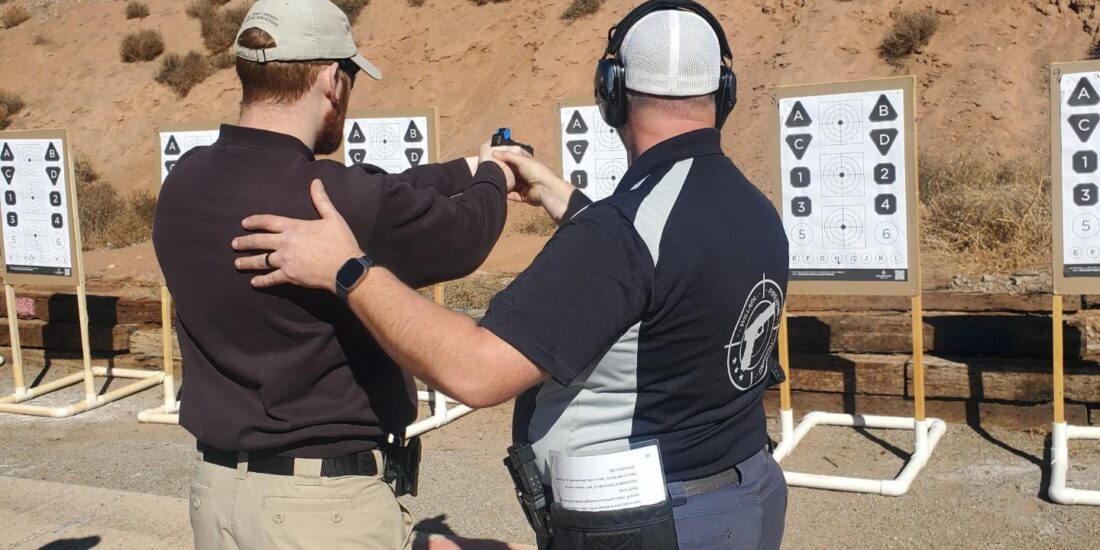Jeff Cooper: The Desired Characteristics of a Superior Pistol Coach
0 comments
310

Col. Jeff Cooper is very eloquent on coaching
Jeff Cooper’s Commentaries Vol. 12, No. 5
“We have been asked by several serious people to set forth the desired characteristics of a superior pistol coach. We know something about this, having wrestled with the problem for more than thirty years. Nobody knows all the answers, but a good many shooting schools are not even aware of the questions. We submit our opinions as follows:
The Master of Arms
When I founded Gunsite here in Arizona (1975), I sought to establish the fountainhead of information and doctrine on the serious use of the service pistol. To do this I tried to enlist those competitive shooters who had distinguished themselves over the previous fifteen years in California. Not all were agreeable to the proposition, and some who were agreeable were unable to handle it. I did discover, however, over the opening period, the qualities which make for a proper Master of Arms.
In the classic sense a Master is not a practitioner, but rather a teacher. Being an expert at any practice does not necessarily mean making a good teacher. Various champions who have attempted to set up schools have met with no success because, while they could certainly do what was necessary, they could not properly explain to others why they could. So in the course of time I have concluded that the essential characteristics of a pistol or rifle coach may be stated as follows:
To begin with, the instructor should know his subject thoroughly. That may seem obvious, but knowing how to shoot well is more important than being able to shoot well. Naturally the instructor must be able to demonstrate personally all elements of the techniques he teaches. He cannot expect his students to do what he cannot do. It is certainly not enough, however, to demonstrate an expert stroke and then simply tell his people “Now you do that.” The physiology and geometry of the human body as it serves as a gun mount must not only be demonstrated, but clearly explained. The instructor must invite both question and criticism, and be able to answer articulately.
The qualified small arms coach must possess, besides complete knowledge of his subject, a strong desire to impart. Not everyone who performs well with his weapon possesses this attribute. I have known people who were excellent shots who rather resisted teaching anyone else how to shoot, even professionally, because they evidently wanted to keep such skill to themselves. But a good instructor, above all, must seek his student’s excellence. He must place more value on his ability to teach a man to shoot than on his own ability to shoot. His work gratifies his ego when his student becomes a good shot, and improvement is more satisfying than excellence. It is fine to raise a B shooter to the A category, but it is far better to raise a D to a B. Shooting excellence at all levels, however, is what makes his work worthwhile.
The shooting instructor must understand correct training procedures. He must know the order in which the essentials are presented and understand the need for time intervals in which to allow information imparted to sink in. He should know when students are more perceptive and why, and he must realize that matters which are quite obvious to him may be complete mysteries to a novice. This sort of knowledge is not inherent and must be acquired through experience. This is why a man should put in valuable time as coach before he may become qualified as Range Master.
A shooting coach must possess what may be called Command Presence, since he has no military authority over his class. Command Presence is demonstrated by carriage, voice, demeanor, and tact. Under no circumstances should the shooting coach conduct himself like a drill instructor with a recruit. I have had students from the law enforcement establishment regard me as a sort of military superior, and I had to explain clearly that I was there to help them improve, rather than to force them into a pattern. It is absolutely necessary for a shooting coach to avoid the use of gutter language. He may think that this makes him sound authoritative, when all it actually does is display boorishness and a limited vocabulary.
The successful instructor should be careful of his appearance. Slovenliness is proper cause for disrespect.
The staff instructors must not argue with each other in front of the class. If there are points of disagreement, they must be resolved privately, and preferably before they are discovered to be a problem.
The instructor should be friendly without being impertinent. You learn better from a friend than from a boss, but you do not learn well from a comedian.
It is particularly desirable that the pistol instructor “have seen the elephant.” That is to say, he should have at one time engaged in a gunfight, been shot at and shot back. Only thus will he be able to explain to his students what it is like to engage in lethal combat.
Finally, the instructor must be articulate, able to convey his ideas clearly and concisely.
The search for properly qualified instructional staff in any shooting school is an unending task. When any training institution begins to hire its staff carelessly without quality in mind, it becomes a mere shooting gallery rather than an institute of higher learning.”




